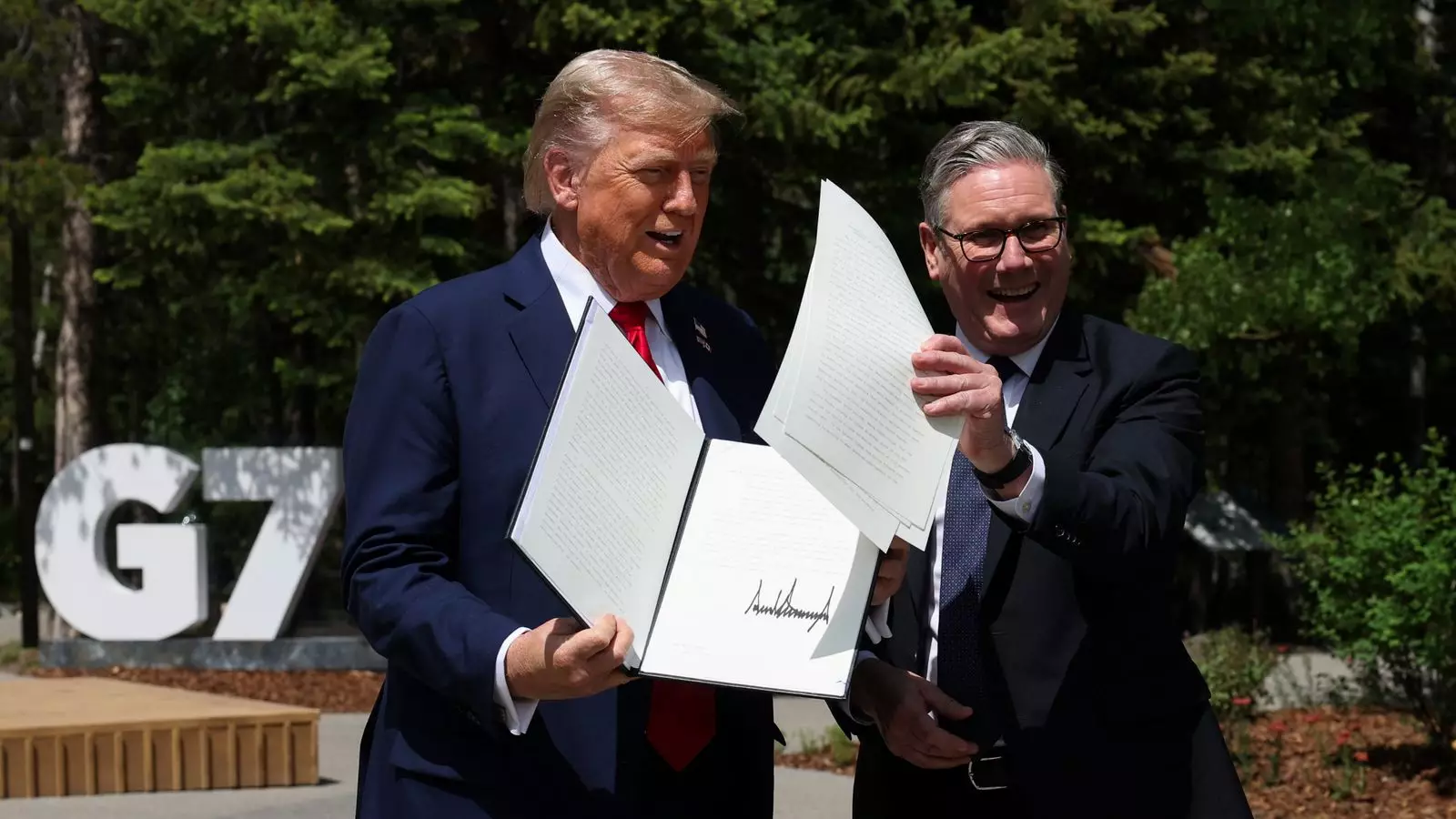The recent announcement of the UK-US trade deal, heralded by none other than Donald Trump, is a classic case of political theater masquerading as economic triumph. With Trump exclaiming that the deal is “done” and “fair for both,” we must question the substance of such claims. Indeed, while the leaders present a united front, it’s crucial to peel back the layers of this agreement to scrutinize its true implications, especially for the average citizen whose daily life will be impacted far more than the headlines suggest.
Contrary to the bold proclamations of job creation and increased income, one must wonder how many of these promised opportunities will trickle down to the working class. The relationship history between the two nations is steeped in a complex interplay of interests, where the upper echelons of both societies tend to benefit disproportionately from any major economic deal. Sir Keir Starmer may tout this agreement as a “really important” moment, but for countless British families struggling to make ends meet, the idea of a “strong sign of strength” feels hollow amidst growing economic inequality.
The Fine Print of Tariffs and Trade
The specific aspects of this trade agreement, such as the reduction of tariffs on cars and aerospace, may indeed sound beneficial on the surface. However, it’s imperative to understand what “protecting” the UK entails in this context. Trump’s vague comments about potential tariffs on British steel exports raise a red flag. It signifies a bargaining position that is less about fair trade and more about leverage, a model that has become characteristic of Trump’s unpredictable approach to international relations.
Furthermore, when Trump jovially states that the UK is “very well protected” against future tariffs “because I like them,” it creates an unsettling atmosphere. It suggests that trade negotiations have devolved into personal favors rather than formal economic treaties aimed at fostering genuine mutual prosperity. The international marketplace functions best when trade is driven by cooperation, respect, and equitable policies—none of which seem to emanate from such transactional dialogues.
Leadership and the Art of Compromise
In an era where political discourse is often characterized by polarization, the characterization of leadership within the context of this trade deal becomes critical. Trump’s acknowledgment of Sir Keir Starmer as “slightly more liberal” builds a façade of camaraderie that masks substantial ideological divides. The spectrum of political perspectives should ideally inspire fruitful exchanges; however, the reality often leads to compromise without meaningful consultation or accountability.
It’s troubling that the leaders have taken to celebrating what they view as mutual respect when the broader implications of their agreement lean more towards cronyism than genuine collaboration. The optics of Trump and Starmer holding a physical copy of the agreement—only for Trump to lose its pages—seems like a metaphor for the precarious nature of this deal itself. It hints at the fragility of such arrangements and raises concerns about whether such an agreement can withstand the trials of time and governance.
Economic Optimism vs. Political Reality
While the narrative spun around this trade deal attempts to evoke a sense of excitement, we must temper such optimism with a healthy dose of skepticism. The promise of jobs and income often serves as a double-edged sword, where economic gains are too frequently contingent upon the exploitation of labor and resources. The global marketplace can bring enhancements in efficiency and scale, yet it seldom translates into equitable distributions of wealth.
The backdrop of the G7 summit—one of political unity against a varied landscape of social challenges—underscores the stark contradictions inherent in today’s politics. It is perplexing when leaders of such renown can wax lyrical about trade deals while disregarding the voices of those who will invariably bear the brunt of these decisions. How do we reconcile the ceremonial signing of agreements with the everyday struggles faced by the electorate? The answer may lie in ensuring that trade agreements are backed by robust dialogue with the communities they affect most profoundly.
This trade deal, in essence, does little to reassure the public that they will see tangible benefits. Instead, it reveals a troubling scenario where political leaders can bask in the glow of apparent success while the true effects of their decisions linger in the shadows, unaddressed and unaccounted for. Thus, as spectators to this act of political choreography, we must remain vigilant and demand a trade agenda that prioritizes the welfare of people over allegiances born out of expediency.


Leave a Reply